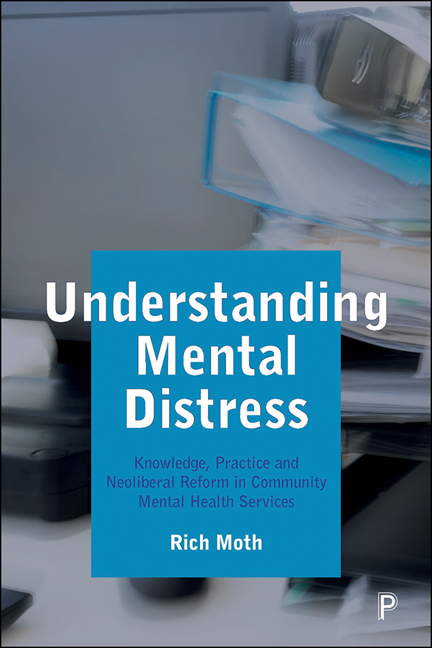 Understanding Mental Distress
Understanding Mental Distress Book contents
- Frontmatter
- Dedication
- Contents
- List of tables
- List of abbreviations
- Notes on the author
- Acknowledgements
- Introduction
- PART I Sociohistorical contexts of policy and practice
- PART II Lived experiences of neoliberal reform
- PART III Theorising knowledge and practice
- Conclusion
- Appendix: methodology
- Notes
- References
- Index
- Frontmatter
- Dedication
- Contents
- List of tables
- List of abbreviations
- Notes on the author
- Acknowledgements
- Introduction
- PART I Sociohistorical contexts of policy and practice
- PART II Lived experiences of neoliberal reform
- PART III Theorising knowledge and practice
- Conclusion
- Appendix: methodology
- Notes
- References
- Index
Summary
Understandings of the diverse lived experiences to which terms such as ‘mental distress’, ‘mental illness’ and ‘mental disorder’ are applied have long been highly contested. These debates, conflicts and struggles over meaning and practice are commonly characterised in terms of the different ‘models of mental health’, which typically range from biomedical to psychological and social frameworks (Colombo et al, 2003; Davies and Bhugra, 2004; Tyrer, 2013; Davidson et al, 2016). The tensions associated with these divergent models have, however, sharpened over recent years. The controversy over the latest (fifth) iteration of the Diagnostic and Statistical Manual of Mental Disorders (DSM-5) (American Psychiatric Association, 2013), the ‘bible’ of so-called mental disorders, which was widely regarded as further embedding biomedical perspectives (Gornall, 2013), was followed by the intervention of Dainius Pūras, United Nations Special Rapporteur on the Right to Health. He called for a revolution in mental healthcare in terms of a shift from a biomedical to a social and human rights paradigm (United Nations Special Rapporteur on the Right to Health, 2017). Alongside these global controversies, debates in the United Kingdom (UK) have also intensified. Recent interventions include calls by survivors and allies for policy and services to shift from biomedical towards more social and social-justiceoriented perspectives (Beresford et al, 2016; Beresford, 2019), and an increased profile for trauma-informed approaches following the publication of the Power Threat Meaning Framework (Johnstone et al, 2018).
This book offers a research-informed contribution to this arena of contestation. However, it does so not by proposing a new or refined categorisation of these divergent theoretical perspectives. Instead, it provides a contextually situated ethnographic exploration of the way in which the action environment of mental health services shapes and structures how practitioners, service users and carers articulate and utilise these different models of mental distress and associated practices within their everyday activities and interactions. This is necessary because, in the ‘real-world’ setting of mental health services, models are not just a scholarly concern but also inform particular forms of action such as care, support, treatment, detention and the deprivation of liberties.
- Type
- Chapter
- Information
- Understanding Mental DistressKnowledge, Practice and Neoliberal Reform in Community Mental Health Services, pp. 1 - 10Publisher: Bristol University PressPrint publication year: 2022


